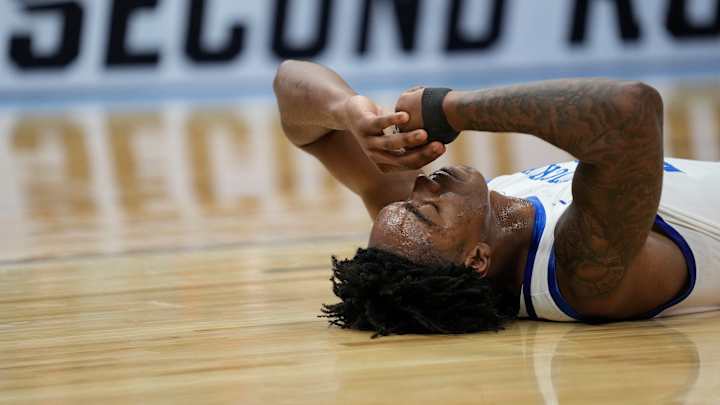When Amari Williams transferred to Kentucky, he knew the standards under new head coach Mark Pope were going to be high. But he didn’t expect to face one of the toughest punishments of his basketball life—one that left him and his teammates gasping for air, legs wobbling, and jerseys drenched.
And it all started because one player showed up late.
The Drill: What Is a “17”?
For those outside the basketball world, a “17” is a conditioning test straight out of a nightmare. Players sprint sideline to sideline across the width of the court 17 times in a row—full speed, no shortcuts.
Now imagine not running one of those. Not five. Not even ten.
Seventeen straight 17s.
That’s 289 sprints in total—nearly 11 miles worth of all-out effort inside the gym. The whole roster had to do it, all because one teammate wasn’t five minutes early to practice.
“We thought we were doing one 17,” Williams said. “Next thing you know, it turned into seventeen 17s. It was insane.”
The Culture Behind the Punishment
At first glance, it sounds excessive. But Pope wasn’t just making his players run for punishment’s sake. He was sending a message: details matter.
At Kentucky under Pope, “five minutes early” doesn’t mean 4:59. It means 4:55. And when one player slips, everyone feels it.
Other legendary coaches have enforced similar discipline:
Mike Krzyzewski (Duke) would cancel practices for lateness, then double the workload the next day.
Tom Izzo (Michigan State) once held entire practices where no one touched a basketball because of curfew violations.
The philosophy is simple: if you let the small things slide, you’ll crumble when the pressure is highest—in March.
Breaking Down the Numbers
To put the punishment in perspective:
A college court is 94 feet long, 50 feet wide.
A sideline-to-sideline sprint = 47 feet.
One “17” = 1,598 feet (about 0.3 miles).
Seventeen 17s = 5.1 miles of sprints, not counting fatigue.
Sports scientists estimate the toll feels closer to 10–11 miles of high-intensity work.
That’s not conditioning. That’s survival training.
Why It Matters for Kentucky
This wasn’t about cruelty. It was about identity. Pope is trying to rebuild Kentucky basketball with three cornerstones:
Discipline in preparation – five minutes early isn’t optional.
Shared accountability – one man’s mistake becomes everyone’s burden.
Toughness through suffering – mental and physical resilience when games are on the line.
It’s no coincidence Pope’s BYU teams often thrived in close games. Conditioning and discipline carry over when legs are tired in March. Kentucky is now being molded the same way.
The Psychology of Collective Suffering
Sports psychologists often call this “shared pain.” Instead of dividing a roster, it bonds them. When the entire team pays for one mistake, players start holding each other accountable long before the coach needs to step in.
That’s how standards stick—and how winning cultures are built.
Looking Ahead
To fans, “289 sprints” might sound insane. Maybe it is. But it’s also a window into the culture Pope is determined to create at Kentucky. Talent has never been the problem in Lexington. The challenge has been discipline, identity, and execution when it matters most.
If Amari Williams’ story is any indication, those things are now being forged—one sprint at a time.
BBN Question: Will this no-nonsense discipline pay off in March, or is Pope pushing the Wildcats too hard too soon?

